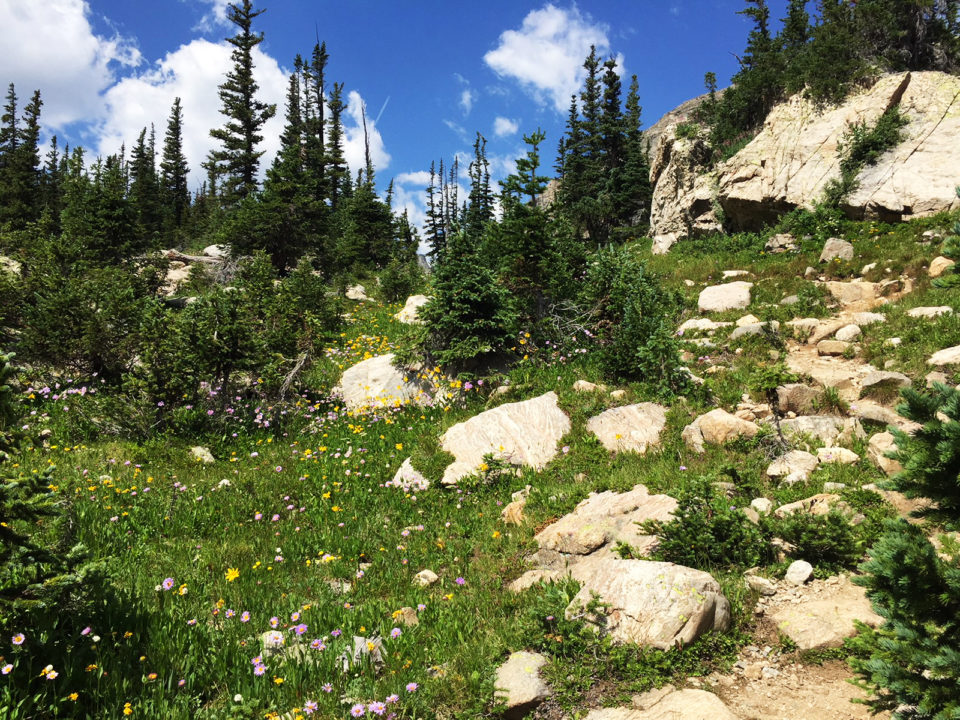The Local newsletter is your free, daily guide to life in Colorado. For locals, by locals. Sign up today!
Length: 8 miles roundtrip to Finch Lake; 12 miles roundtrip to Pear Lake
Difficulty: Moderately difficult
Why We Love It: This hike lets you enjoy the gorgeous mountain scenery without the crowds or an incessantly steep slope.
When to Go: June through September, when the high country is free of snow
Post-hike Buzz: Drop by Allenspark’s Meadow Mountain Café for a salmon burger or a hearty plate of bacon and eggs along with a refreshing serving of small-town charm.
Restrooms: None at trailhead
Distance from Denver: About 60 miles
Dogs: Not allowed due to national park restrictions
Yes, you can enjoy the summer beauty of Rocky Mountain National Park without fighting the crowds, and one of our favorite ways to do so is Finch Lake. Because it accesses the lesser-known southern portion of Wild Basin from a remote trailhead outside RMNP’s boundaries, a hike here avoids both the masses and the entrance fee. Plus, the relatively modest elevation gain—1,900 feet to Finch Lake and 2,400 feet to Pear Lake—means you’re able to enjoy the scenery along the way.
That's only $1 per issue!
From the trailhead, the path immediately starts ascending through the quiet evergreen forest. Within 0.2 miles you’ll pass a sign welcoming you to the RMNP, yet you won’t likely find a steady stream of visitors taking selfies.
As you continue to climb, there are tantalizing glimpses of Longs Peak through breaks in the trees. After two miles, you arrive at a major trail junction, where you should take the left-hand trail that is signed to Finch Lake. During the next stretch, the impressive southern sides of both Longs Peak and Mt. Meeker come into view, along with a series of toothy peaks that comprise the Continental Divide.
After two more miles of climbing, the trail drops a couple hundred vertical feet to reach Finch Lake, which is nestled among the trees. This is a peaceful and sheltered spot to enjoy a picnic or to hang a hammock and bask in the warm summer sunshine.
If you’re up for a longer hike, you can continue up to Pear Lake, which is located in a more rugged setting, with nice views of craggy peaks visible from its shoreline. To reach Pear, stroll around Finch Lake’s northern side, staying straight on the trail paralleling Finch Lake even when signs to Pear Lake (temporarily) disappear.
Once past Finch Lake, continue to follow the signs for two more miles up the valley, which is steep at times. The final pitch crosses a pristine alpine meadow filled with purple, yellow, and white wildflowers. Once you reach the lake, you’ll be rewarded with beautiful views of sheer cliffs and high peaks still dotted with snowfields even in the height of summer. Bring a snack so that, weather permitting, you can linger and enjoy this serene setting. When you’re ready to return to your vehicle retrace your steps, remembering to follow signs to the Allenspark (not the Finch Lake) trailhead.

Getting there: From Denver, take US-36 through Boulder to Lyons. Just past 4th Street, turn left to follow Co- 7 toward Allenspark. Once there, turn left (it’s the only left-hand turn in town), and then take an immediate right onto Road 90, which quickly turns to dirt. Continue straight for 0.8 miles to a T-junction. Stay straight here, where the street name changes to South Skinner Road. Switchback up the hill for 0.6 miles until you reach Meadow Mountain Drive. Turn right here and, after 0.1 mile, turn right again into the signed Allenspark Trail parking area. 2WD vehicles with decent torque should be able to reach this lot as long as the road is dry. Alternatively, you can pay the park entrance fee and start at the Finch Lake Trailhead in the Wild Basin section of RMNP.







